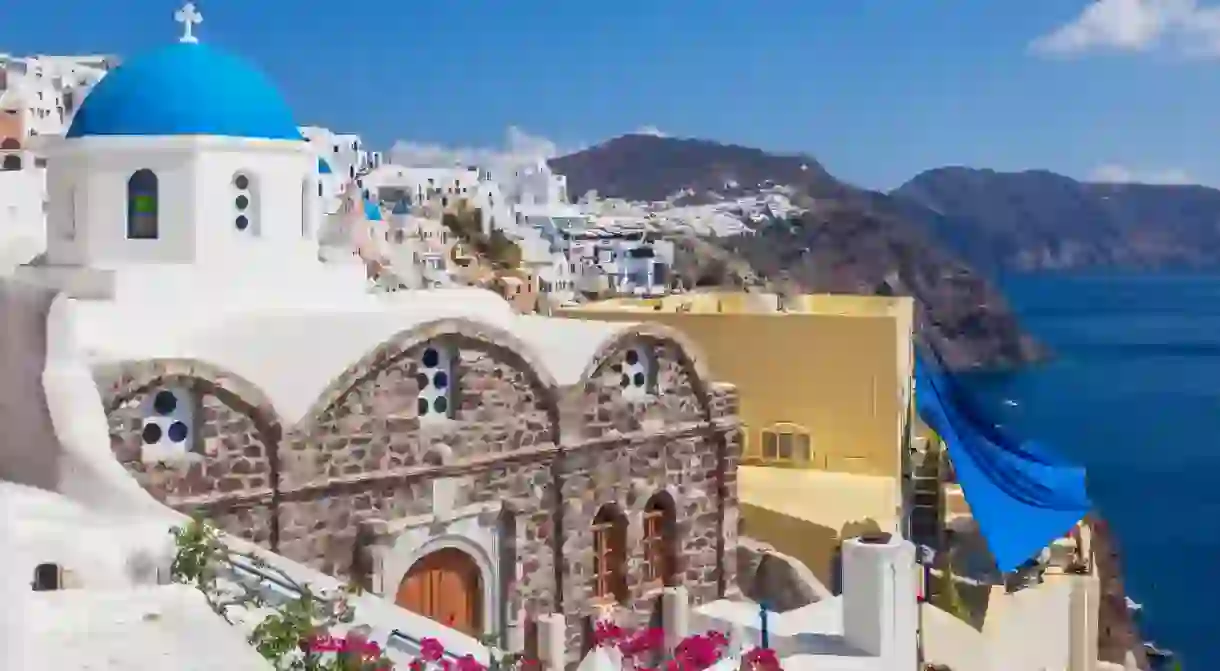How to Spend Seven Days Island Hopping Around the Cyclades, Greece

Whitewashed labyrinthine towns designed to confuse pirates, dramatic limestone cliffs and crystalline waters define the Cyclades islands. Northerly winds, known as the meltemi, blow through this part of Greece in summer, making this region a sailor’s dream – although best suited to intermediate and advanced folk. Here’s our suggested itinerary for exploring this island group in the Aegean Sea by boat.
Kick start your seafaring adventure by hiring a yacht with SamBoat. Alternatively, upgrade to a fully-crewed experience with Dream Yacht Charter.
Day 1 – Paros
Settle into Cycladic island life with a walk amid the neoclassical homes of Paros’ capital Parikia. If you arrive early, visit the fourth-century Panagia Ekatontapiliani church, before taking a tour of Kamarantho Organic Farm. Here, stock up on organic seasonal produce, early harvest extra virgin olive oil and aromatic herbs. Catch sunset from the courtyard of Agios Konstantinos church, then stop at Atelier 1935 to pick up a pair of handmade leather sandals. Alternatively, laze away the afternoon at unspoiled Piso Alyki beach on the southwest coast, and dine on sundried fish (gouna) and other traditional Parian dishes at Mouragio taverna.

Day 2 – Paros to Sifnos
Sifnos is staunchly no-frills Cyclades and that’s unlikely to change any time soon. From Parikia, set sail for Kamares, the island’s harbour. If you don’t find space on the quay, drop anchor in the bay, wind conditions permitting. Head north to the far-flung fishing village of Heronissos for local chargrilled fish at Cheronissos Fish Tavern, then take a late afternoon dip at nearby Vroulidia beach. Alternatively, head to the medieval town of Kastro, on the eastern coast. Trek the cliffside path and peer down at the Seven Martyrs chapel perched on the rocks below. Don’t miss Kavos Sunrise bar, where mojitos are DIY and the décor reflects owner Kostas’ life-long love affair with Cuba. Back in Kamares, if there is too much swell, sail south to sheltered Vathy Bay and anchor there for the night.

Day 3 – Sifnos to Folegandros
With its precipitous cliffs, parasol-free beaches and atmospheric main town, Folegandros is superb in its simplicity. At the isle’s port, Karavostasi, there are a handful of spaces on the quay for visiting yachts. Explore beaches like pristine Katergo and naturist-favourite Agios Nikolaos, or head to the sandy shores of Vorina and Serfiotiko, but only when the meltemi isn’t blowing. In the evening, walk up to hilltop Hora, 50 minutes on foot. Stroll through the medieval settlement Castro, where some houses are more than 1,000 years old. In the two main squares of Hora, let your children run free while you sample local souroto cheese pies and goat casserole at tavernas like Chic and Goupi.

Day 4 – Folegandros to Santorini
Arriving by boat into Santorini’s famed caldera, a submerged volcanic crater, is a once-in-a-lifetime experience. Words, and even images, fail to paint an accurate picture of white traditional homes clinging to rust-coloured cliffs that plunge into the navy sea. Leave your boat at Vlychada marina – closely follow the pilot book guidance on the approach. Oia is where you’ll find the iconic blue and white church domes, colourful cave residences and cobblestoned streets filled with galleries, boutiques and sea-facing cafes. Make sure you visit the painstakingly preserved Bronze Age settlement Akrotiri, which has been compared to Pompeii but, mysteriously, with no evidence of human remains. For dinner in Oia, book Roka; it serves updated Santorinian comfort food like local yellow split pea puree with smoked eel, samphire and caper chutney.

Day 5 – Santorini to Amorgos
Amorgos is an insider favourite among Greeks as it has remained relatively undisturbed by tourism. Scenes from Luc Besson’s cult film The Big Blue were shot here. Amorgos’ two ports, Katapola and Aegiali, offer good protection from prevailing northerly wind. Spaces on the quay are limited but both locations offer anchorages with decent holding. Nestled in a vertiginous cliff-face 300m (984ft) above the sea, the Monastery of Panagia Hozoviotissa is an architectural marvel and one of Greece’s most unusual spiritual landmarks. In the evening, everyone gathers in Hora to share meze and clink glasses of local spirit psimeni raki at a mezedopolio like TranzisToRaki. If weather conditions are favourable, anchor overnight in the shimmering embrace of Kalotaritissa Bay or off Gramvousa islet, a short sail north.

Day 6 – Amorgos to Paros
The charm of celebrity magnet Naousa lies in the fact that it is subtly chic while retaining its Cycladic fishing village feel. Traditional round-bellied caiques (fishing boats) bob in the harbour beside a string of slick cocktail bars. Zig-zag your way through immaculate alleyways amid whitewashed buildings housing high fashion boutiques, jewellery stores and foodie stops like Petra Farm’s shop, where you can pick up fine Parian delicacies. To the north is the Paros Environmental and Cultural Park featuring hiking trails, a monastery, beaches and an amphitheatre that hosts summer events. Agios Ioannou Bay, close to the Monastery of Ai Yiannis Detis, is one of the most tranquil locations to drop anchor. Finish the day with a candlelit cocktail at Karnagio in Naoussa’s Little Venice.

Day 7 – Antiparos and Paros
Conclude your Cycladic adventure with a day on Antiparos, a tiny island southwest of Paros. The stark white cubist homes of main town Hora huddle around a bay on the northeastern coast. Its cobblestoned promenade, studded with boutiques and bars, comes into its own at night. For a little more peace and quiet, head southeast to Soros beach. Take a seat on the terrace of the family-run taverna Peramataki for a post-swim lunch of village-style pies, fried mullet and steamed greens. Once safely docked back in Parikia, celebrate your final evening with contemporary Greek cuisine at Leventis in the old town.

Explore the Cyclades by renting a yacht with SamBoat. Elevate your adventure with a fully-crewed sailing vacation with Dream Yacht Charter.
This is an updated rewrite of an article originally by Ethel Dilouambaka.













